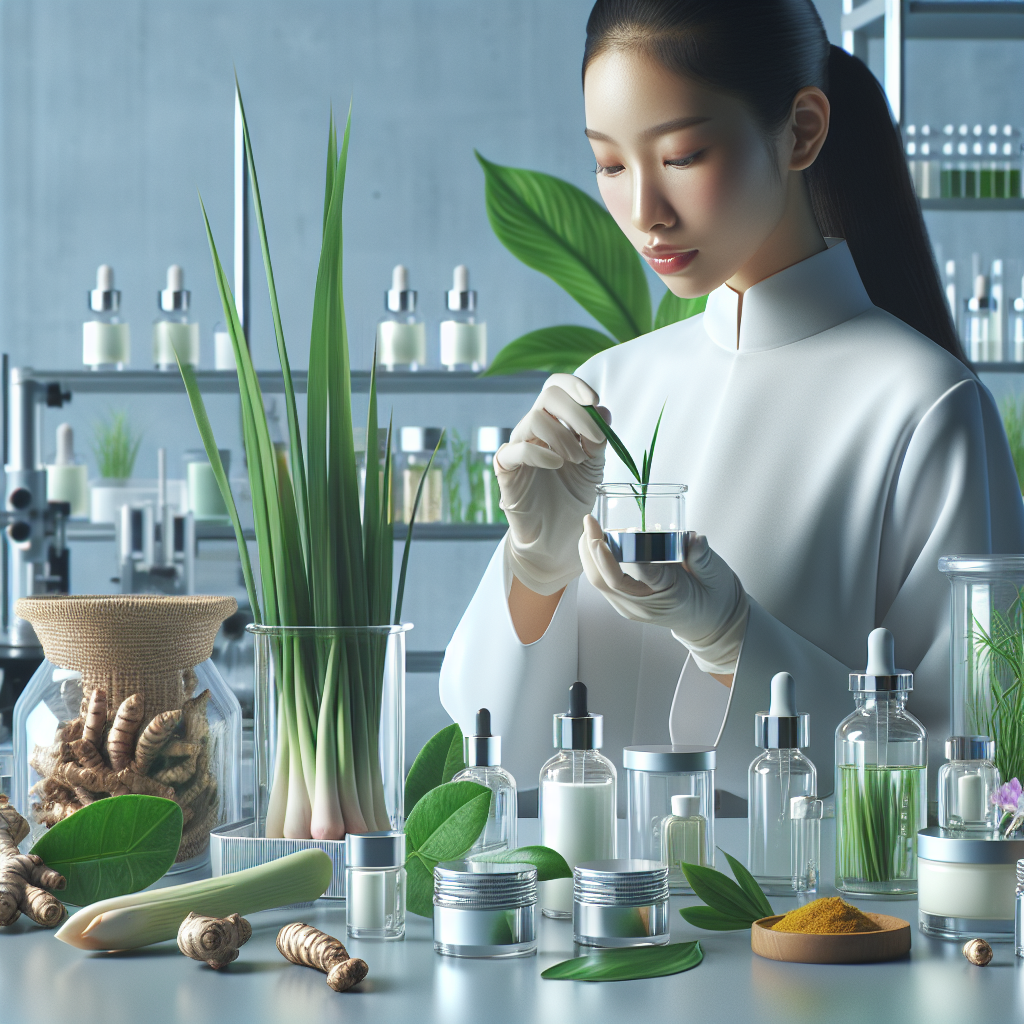
In an era where beauty and sustainability harmoniously intertwine, the future of skincare is being reshaped by organic cosmetic materials sourced from Vietnam. This Southeast Asian nation, renowned for its rich biodiversity and agricultural heritage, is poised to become a significant player in the organic cosmetics market. As consumers worldwide shift towards chemical-free beauty solutions, Vietnam’s natural resources, such as coconut oil, aloe vera, and turmeric, are gaining prominence for their skin-enhancing properties. The organic cosmetics industry in Vietnam is expected to grow at a CAGR of about 4% from 2024 to 2028, reflecting a global trend towards eco-friendly and health-conscious beauty products. This growth is fueled by increasing disposable incomes and a deeper consumer awareness of the potential risks associated with synthetic ingredients. As the demand for sustainable skincare rises, Vietnam’s unique blend of traditional knowledge and modern innovation positions it as a promising hub for organic cosmetic materials, offering global consumers a path to beauty that is both natural and ethical.
- 1. The Future of Skincare: Organic Cosmetic Materials from Vietnam
The Future of Skincare: Organic Cosmetic Materials from Vietnam
The skincare industry is undergoing a profound transformation, driven by a global shift towards sustainable and health-conscious beauty products. At the forefront of this evolution is Vietnam, a country rich in natural resources and traditional knowledge, which is poised to become a key player in the organic cosmetics market. As consumers increasingly prioritize health and environmental sustainability, the demand for organic cosmetic materials from Vietnam is expected to soar. This article explores the future of skincare through the lens of organic cosmetic materials sourced from Vietnam, examining the trends, benefits, and potential of this burgeoning market.
The Rising Demand for Organic Skincare Products
The global skincare industry is witnessing a growing demand for organic products, fueled by an increasing awareness of the benefits of natural ingredients and the potential risks associated with synthetic chemicals. In Vietnam, this trend is particularly pronounced, with the organic cosmetics market projected to grow at a compound annual growth rate (CAGR) of approximately 4% from 2024 to 2028. This growth is driven by a shift in consumer preferences towards chemical-free skincare solutions that align with health and environmental consciousness.
Key Drivers of Market Growth
1. **Health and Safety Concerns**: Modern consumers are becoming more discerning about the ingredients in their skincare products. Concerns over the long-term effects of synthetic chemicals, such as parabens and sulfates, have led many to seek out safer alternatives. Organic cosmetics, which are free from harmful chemicals, offer a compelling solution.
2. **Sustainability and Eco-Friendliness**: As awareness of environmental issues grows, consumers are increasingly looking for products that minimize their ecological footprint. Organic cosmetics, often derived from sustainably sourced ingredients, cater to this demand by offering eco-friendly options that support sustainable development.
3. **Cultural and Traditional Influences**: Vietnam boasts a rich heritage of using natural ingredients for beauty and wellness. This cultural backdrop provides a strong foundation for the growth of organic cosmetics, as consumers gravitate towards products that are not only effective but also culturally resonant.
Vietnam’s Unique Position in the Organic Cosmetics Market
Vietnam’s unique combination of abundant natural resources and traditional knowledge positions it as a promising hub for organic cosmetic materials. The country’s diverse climate and fertile soil support a wide range of plant species that are ideal for cosmetic use. Some of the most popular ingredients include coconut oil, aloe vera, and turmeric, each offering distinct benefits for skincare.
Popular Organic Ingredients from Vietnam
– **Coconut Oil**: Renowned for its moisturizing properties, coconut oil is a staple ingredient in many organic skincare products. It is rich in fatty acids and antioxidants, making it an excellent choice for nourishing and protecting the skin.
– **Aloe Vera**: Known for its soothing and healing properties, aloe vera is widely used in products designed to treat skin irritations and promote hydration. Its natural anti-inflammatory and antimicrobial properties make it a sought-after ingredient in organic formulations.
– **Turmeric**: Celebrated for its anti-inflammatory and antioxidant benefits, turmeric is an ingredient of choice for combating signs of aging and promoting a healthy complexion. Its vibrant color and natural efficacy make it a popular addition to organic skincare lines.
The Future Outlook for Vietnam’s Organic Cosmetics
The future of skincare in Vietnam looks promising, with several factors contributing to the anticipated growth of the organic cosmetics market:
1. **Increasing Disposable Incomes**: As disposable incomes rise, particularly in urban areas, consumers have more purchasing power to invest in premium organic skincare products. This trend is expected to drive the market for high-quality, locally sourced cosmetics.
2. **Government Support and Policies**: The Vietnamese government has shown support for sustainable industries, including organic agriculture and cosmetics. Policies that promote the development and export of organic products are likely to bolster the market further.
3. **Innovation and Research**: Ongoing research into the benefits and applications of local ingredients is likely to yield innovative products that meet consumer demands for efficacy and sustainability. Collaboration between local producers and international brands can enhance product offerings and expand market reach.
Challenges and Considerations
While the potential for growth is substantial, there are challenges that Vietnam must address to fully capitalize on its organic cosmetics market potential:
– **Quality Assurance**: Ensuring consistent quality and authenticity of organic products is crucial for gaining consumer trust and meeting international standards.
– **Education and Awareness**: Educating consumers about the benefits of organic cosmetics and dispelling myths about their efficacy can help drive wider adoption.
– **Supply Chain Development**: Building a robust supply chain that supports sustainable sourcing and production practices is essential for long-term success.
Conclusion
The future of skincare is undeniably intertwined with the principles of health, sustainability, and cultural heritage. Vietnam, with its rich natural resources and growing commitment to organic practices, is well-positioned to lead this transformation. As the global demand for organic cosmetic materials continues to rise, Vietnam’s role in the skincare industry is set to expand, offering exciting opportunities for innovation, growth, and sustainable beauty. By embracing its unique strengths and addressing key challenges, Vietnam can become a beacon for the future of skincare, providing consumers worldwide with safe, effective, and eco-friendly solutions.
**Q1: Why is the future of skincare focusing on organic cosmetic materials from Vietnam?**
The future of skincare is increasingly focusing on organic cosmetic materials from Vietnam due to a combination of factors. Firstly, there is a growing global demand for sustainable and eco-friendly beauty products. Vietnam’s rich biodiversity provides an abundance of natural ingredients like coconut oil, aloe vera, and turmeric, which are highly valued in the cosmetics industry. Furthermore, as consumer awareness about the potential risks of synthetic ingredients rises, there is a shift towards organic products that promise health benefits alongside beauty. The Vietnamese cosmetics market is also expanding rapidly, with a projected CAGR of around 4% from 2024 to 2028, driven by increased disposable incomes and a growing interest in chemical-free cosmetics.
**Q2: What are the benefits of using organic cosmetic materials from Vietnam?**
Organic cosmetic materials from Vietnam offer several benefits. They are derived from natural sources, reducing the risk of skin irritation and allergic reactions that can be associated with synthetic chemicals. Ingredients like coconut oil, aloe vera, and turmeric not only provide moisturizing and anti-inflammatory properties but are also known for their skin-nourishing qualities. Additionally, using locally sourced organic materials supports sustainable agricultural practices in Vietnam, contributing to the country’s economic growth and environmental sustainability.
**Q3: How does the consumer interest in organic cosmetics impact the Vietnamese market?**
The rising consumer interest in organic cosmetics significantly impacts the Vietnamese market by driving demand for natural and chemical-free products. This shift is leading to increased production and innovation in organic skincare solutions. As more consumers prioritize health and sustainability, Vietnamese manufacturers are investing in the development of high-quality organic products. This trend is supported by the country’s abundant natural resources, which provide a competitive edge in the ASEAN region. The market’s growth is further fueled by an increase in disposable incomes, enabling consumers to spend more on premium beauty products that align with their values.
**Q4: What challenges does Vietnam face in promoting its organic cosmetic industry globally?**
Despite the promising growth, Vietnam faces several challenges in promoting its organic cosmetic industry on a global scale. One major challenge is the need for international certification to assure global consumers of the authenticity and safety of its organic products. Additionally, there is strong competition from established organic markets in countries like the USA and Europe, which have more advanced technology and marketing strategies. To overcome these challenges, Vietnam must focus on enhancing its production quality, securing certifications, and building strong international marketing campaigns that highlight the unique benefits of its locally sourced ingredients.
**Q5: How is the shift towards organic cosmetics influencing the beauty industry in Vietnam?**
The shift towards organic cosmetics is transforming Vietnam’s beauty industry by aligning it more closely with global trends of health and sustainability. This transformation is evident in the increased investment in research and development of natural products, as well as the adoption of eco-friendly packaging. Vietnamese consumers are becoming more conscious of the ingredients in their skincare products, leading to a preference for brands that offer transparency and prioritize ethical sourcing. This shift not only boosts the domestic market but also positions Vietnam as a potential leader in the organic cosmetics sector within the ASEAN region.
In conclusion, the future of skincare lies in organic cosmetics from Vietnam, driven by a blend of consumer demand, natural resource availability, and a shift towards sustainable beauty practices. As Vietnam continues to innovate and expand its market, it is poised to play a significant role in the global organic cosmetics landscape.
The future of skincare is being reshaped by the rise of organic cosmetic materials, with Vietnam emerging as a key player in this trend. As consumers worldwide become more conscious of the ingredients in their beauty products, the demand for organic cosmetics is growing. In Vietnam, this demand is particularly strong, with the organic cosmetics market expected to see a Compound Annual Growth Rate (CAGR) of approximately 4% from 2024 to 2028. This growth is fueled by a heightened awareness among consumers about the benefits of organic ingredients and the potential risks associated with synthetic components.
Vietnam, along with the Philippines, is poised to become a rapidly expanding market for organic cosmetics within the ASEAN region. This growth is driven by increasing disposable incomes and a growing consumer preference for chemical-free skincare. Products featuring locally sourced ingredients such as coconut oil, aloe vera, and turmeric are gaining popularity, reflecting a global shift towards sustainable and eco-friendly beauty practices.
The Vietnamese cosmetics industry is experiencing a transformation as it aligns beauty with health assurance and sustainable development. This shift is evident in the rising demand for natural cosmetics that prioritize both aesthetics and well-being. Older consumers, in particular, are contributing to market growth by using various cosmetic products for anti-aging and personal enhancement purposes.
Overall, Vietnam’s burgeoning organic cosmetics market underscores a broader trend in the beauty industry, where sustainability and health-conscious choices are becoming paramount. As this trend continues, Vietnam is set to play a significant role in shaping the future of skincare with its rich array of organic cosmetic materials.





コメントを書く